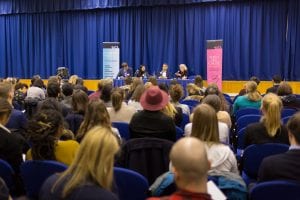How philanthropy helps support our health and life sciences ambitions
By rmhzdal, on 8 May 2019

What we do here at UCL matters enormously.
We provide society’s best chance of tackling some of the most pressing issues of our times. We change students’ lives and improve their life chances. As a university, we aim to be a force for public good and have a positive impact on people, lives and communities.
All of this is worth paying for.
I fully support calls for greater public investment and secure funding streams for the transformative work that we do. However, the environment in which we strive to fulfill our multiple ambitions has become increasingly complex as successive governments reduce levels of core funding while introducing more rigorous performance measurement and accountability. Increased competition, shifts in demand, changes in student numbers and behaviours, as well as the potentially transformational impact of technology and innovation have also affected our operating environment. These challenges have been further exacerbated by the abiding uncertainty regarding the impact of Brexit.
The support of universities by individuals and organisations is not new. Philanthropy has an illustrious tradition in the UK and education has been a significant beneficiary since the Middle Ages. UCL was founded by philanthropy and it remains an important part of our funding mix, and one that makes a unique contribution to what we can achieve.
In September 2016, UCL publicly launched It’s All Academic – a major philanthropy and engagement campaign to raise £600m and generate 250,000 volunteering hours for UCL. It is focused on four key themes, reflecting areas in which UCL is genuinely world-leading and is making a unique impact – health, London, students and disruptive thinking. The key projects include research into dementia and other neurodegenerative diseases, cancer, eye health, and economics and public policy, capital projects including a new neuroscience building, UCL East, a new building for vision and the new Student Centre, and student support such as scholarships.
I’m delighted that health is one of the four major themes of the fundraising Campaign and continues to be the strongest in regards to funds raised. As of the end of January 2019, the theme has raised £369M (cumulative since August 2011).
In addition to the scale of the campaign, I have been impressed by its strategic sophistication and professionalism. The Office of the Vice Provost (Health) and the SLMS Senior Executive Group works closely with the Office of the Vice-Provost Advancement (OVPA) to ensure an integrated approach to fundraising planning and activity. The Deans and I are personally involved in the actual fund-raising initiatives. Importantly, we are not using donations to fill in budget holes but to transform SLMS in order to deliver our ambitions for real world impact.
Some key successes

A hub for the UK Dementia Research Institute and a new home for the UCL Queen Square Institute of Neurology.
Significant gifts totalling over £38m have been raised for a new neuroscience facility on Gray’s Inn Road to host the central hub of UK Dementia Research Institute (UK DRI) and the Queen Square Institute of Neurology. These include: £5M from a UK Foundation, a £3M gift from a Hong Kong based Alumna and £2M from the Wolfson Foundation. Our aim is to create a world-class facility to find effective treatments for dementia and neurological diseases such as: Multiple Sclerosis, Huntington’s Disease, Parkinson’s Disease, Motor Neurone Disease, Stroke and Epilepsy.
Notable gifts for Cancer include £1.87M from a grateful patient donor to support prostate cancer research, £660k from the John Black Charitable Trust to support the MINIMA minimal cancer magnetic therapy Magnetic Resonance Imaging (MRI) project led by Professor Mark Lythgoe in the Centre for Advanced Biomedical Engineering (CABI), and a recently awarded gift of £763k from the JP Moulton Foundation to support a clinical trial in prostate cancer led by Professor Mark Emberton.
SLMS colleagues are also working closely with OVPA on a number of emerging fundraising priorities:
- The Institute of Global Health Leadership aims to improve the efficiency, safety and quality of emerging health care systems.
- A potential fundraising partnership between UCL and the Zoological Society of London could drive forward the ‘one health’ approach linking human, wildlife and domestic animal health.
- OVPA have recently commissioned a fundraising feasibility study for Oriel, to test the philanthropic appeal of our ophthalmology research. Our plan is to build a brand new centre for world-class eye care, leading-edge research and professional training to address the growing burden of eye disease in an increasingly ageing population. The study will help inform our fundraising strategy and support of the UCL Institute of Ophthalmology more widely.
We have also historically benefited from other philanthropic support:
- The Pears Foundation donated £5million towards a new building at the Royal Free which will house the UCL Institute of Immunity and Transplantation (IIT);

The Pears Building will combine NHS patient care with the latest developments in research to provide better treatments for diseases such as cancer, diabetes, HIV and tuberculosis, as well as for traditional and tissue-developed transplants.
- The cost of the Zayed Centre for Research into Rare Disease in Children was met by a combination of fundraising led by Great Ormond Street Hospital Children’s Charity, £10m of funding from the Research England UK Research Partnership Investment Fund(UKRPIF) and a gift of £60m from Her Highness Sheikha Fatima bint Mubarak; and

The Zayed Centre for Research is a world-leading centre of excellence that will enable scientists and clinicians to more accurately diagnose, treat and cure young people with rare diseases.
- The Paul O’Gorman building which houses the UCL Cancer Institute was established through the help of Children with Cancer UK.
Philanthropy is not core funding but it helps us to add excellence to the core, and amplifies and expands what we do. Importantly, it acts as a catalyst to leverage further funding. For example, the combined philanthropic match of £102m for the IIT, Zayed Centre and Queen Square secured £51m from the UK Research Partnership Investment Fund. It increases the profile and influence of a particular project or area of work, brings together people and institutions in new ways, nurtures novel early-stage research and takes it through proof of concept to the point at which funding councils, the NHS, business and industry and other partners have the confidence to invest.
Philanthropic giving in the UK has a healthy trajectory. For 2017-18, giving to UK universities was up 11 percent (£979m to £1.08bn. This reflects both a growing awareness that universities are fundraising organisations and the increasing professionalism of university fundraising.
At the end of 2018, the UCL campaign had raised over £485m and had generated 160,000 volunteering hours. UCL is one of the UK’s highest achieving fundraising universities, usually ranked third in the UK for the level of fundraising income secured, behind Oxford and Cambridge.
Later this month UCL will unveil its new Donor Wall on the Wilkins terrace, which will for the first time recognise donations of over £1m to UCL. Look out for this innovative piece or art designed by a Slade Student – a fitting celebration of philanthropy at UCL.
It is clear that philanthropic giving represents an absolutely vital income stream for SLMS, the university and the health sector as a whole. I look forward to seeing us build on this success.
 Close
Close








